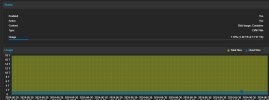Hi, I'm new to ProxMox VE, worked professionally with VmWare for many years.
I have a small homelab running on a Dell T320 with a raid 5 array on 7 disks (+ one spare)
ProxMox itself is installed on a samsung SSD, 250gb
Every time I make a snapshot or run a backup I get IO delays in the region of 15-30-40% and everything slows down to a crawl
My old VmWare ESXi 7 ran on the exact same setup and had no problem with IO delay what so ever.....
If ProxMox wan't to be a serious alternative to VmWare, HyperV, and Citrix then you really have to run on same hardware without any problem.....
I really like ProxMox, don't get me wrong but this has to be fixed.....
I have a small homelab running on a Dell T320 with a raid 5 array on 7 disks (+ one spare)
ProxMox itself is installed on a samsung SSD, 250gb
Every time I make a snapshot or run a backup I get IO delays in the region of 15-30-40% and everything slows down to a crawl
My old VmWare ESXi 7 ran on the exact same setup and had no problem with IO delay what so ever.....
If ProxMox wan't to be a serious alternative to VmWare, HyperV, and Citrix then you really have to run on same hardware without any problem.....
I really like ProxMox, don't get me wrong but this has to be fixed.....


